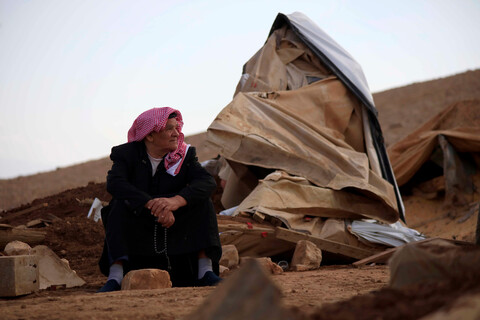The Electronic Intifada 2 March 2021
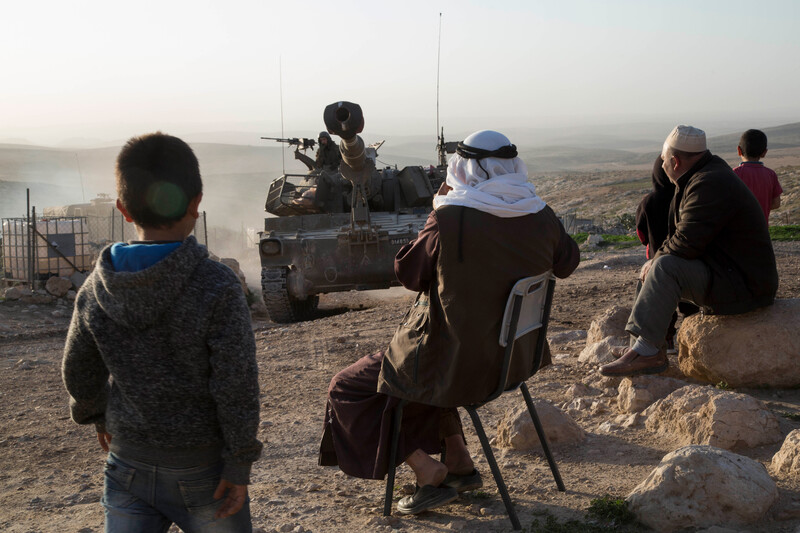
Israeli forces conduct a drill inside a community in the Massafer Yatta area of the West Bank on 3 February, causing damage to infrastructure, agricultural land and residential structures in an area where Israel has been try to expel Palestinian residents for decades.
ActiveStillsDuring the month of February, an Israeli settler shot and killed a Palestinian at an outpost built on land belonging to Ras Karkar, the central West Bank town where the slain man was from.
The Israeli military claimed that Khaled Nufal, 24, was shot after attempting to break into the home of Eitan Ze’ev in the early hours of 5 February.
The incident was quickly called a “terror attack” by Israel’s military, apparently relying solely on the settlers’ accounts, though Nufal was unarmed. No criminal investigation was launched, Israeli media reported.
Tor Wennesland, the UN’s Middle East peace envoy, called on Israel to “conduct a thorough investigation into the circumstances of the incident.”
Human rights groups have long dismissed Israel’s self-investigation system as a “fig leaf for the occupation.”
Nufal was the fourth Palestinian shot and killed by Israeli soldiers and settlers in the West Bank so far this year.
Also in the West Bank during February, two Palestinian men were killed after being struck by cars driven by Israelis. Another Palestinian man was killed by unexploded ordnance in Nuba, a village near the city of Hebron.
West Bank demolitions
Israeli forces demolished or razed dozens of structures in the Jordan Valley community of Khirbet Humsa on multiple occasions during February.
Tents provided as humanitarian aid after the village was razed in November last year were among the items seized. So were food parcels and water tanks.
So far this year, Israeli forces demolished or seized at least 227 Palestinian-owned structures in the West Bank, nearly 100 of them donor-funded. Nearly 370 Palestinians, more than half of them children, have been displaced despite the COVID-19 pandemic.
Gaza fishing boat sunk
Israel’s navy sunk or severely damaged fishing boats off of Gaza’s coast on at least two occasions during February. Israeli occupation forces opened “warning fire” near Gaza’s eastern boundary or off its coast on at least 28 occasions in the first half of the month.
Israel also leveled land inside Gaza at least three times in February.
Egypt reopened Rafah crossing, the sole point of exit and entry for the vast majority of the two million Palestinians living in Gaza. The crossing had been closed for more than two months.
COVID-19 spikes in West Bank
The number of new COVID-19 cases in the West Bank increased significantly at the close of February, indicating “a potential further surge of cases,” the World Health Organization reported.
Israel has rejected the consensus among human rights groups that it is obligated under international law to provide vaccinations to Palestinians living under its military occupation in the West Bank and Gaza Strip.
While Israel has vaccinated more than a third of its population, the 5.2 million stateless Palestinians living under its military rule had only received 32,000 doses by late February.
Israel delayed the transfer of the first COVID-19 vaccines secured by the Palestinian Authority for front-line medical workers in Gaza.
Some Israeli lawmakers sought to condition the transfer of the doses on political concessions from Hamas, the Palestinian resistance faction that governs Gaza’s internal affairs.
At the close of February, the Israeli military body COGAT announced that it would offer vaccines to some 130,000 Palestinians who work in Israel or its settlements.
Omar Shakir, a program director with Human Rights Watch, said that “vaccinating only those Palestinians who come in contact with Israelis reinforces that, to Israeli authorities, Palestinian life only matters to the extent it affects Jewish life.”
There have been more than 200,000 confirmed cases of COVID-19 in the West Bank and Gaza, and around 2,250 deaths attributed to the disease.
Lebanon
Meanwhile, UN figures show that Palestinian refugees in Lebanon are three times more likely to die from complications of COVID-19 than the population in the country as a whole.
Nearly 6,000 Palestinian refugees in Lebanon have been infected with COVID-19 and around 200 have died.
A UN spokesperson said that health conditions aggravated by poverty and the cramped environment in refugee camps contributed to those deaths.
Palestinian and Syrian refugees are included in Lebanon’s vaccine program.

A Palestinian boy stands next to his family’s belongings after the tent in which they were dwelling was dismantled by Israeli forces in the Jordan Valley community of Khirbet Humsa on 2 February.
APA images
A Palestinian woman installs solar energy panels on the roof of a school in Khan Younis, southern Gaza, on 2 February.
APA images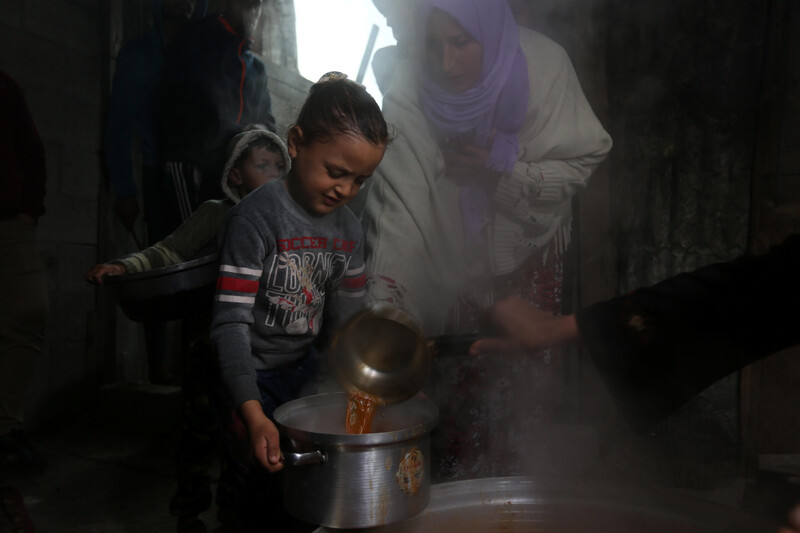
Volunteer cook Amal Abu Amra, 41, distributes free meals to help needy families in an impoverished neighborhood in Gaza City on 4 February. Abu Amra cooks the meals supported by funds sent by benefactors to help feed the poor as poverty and unemployment rates climb ever higher in besieged Gaza.
APA images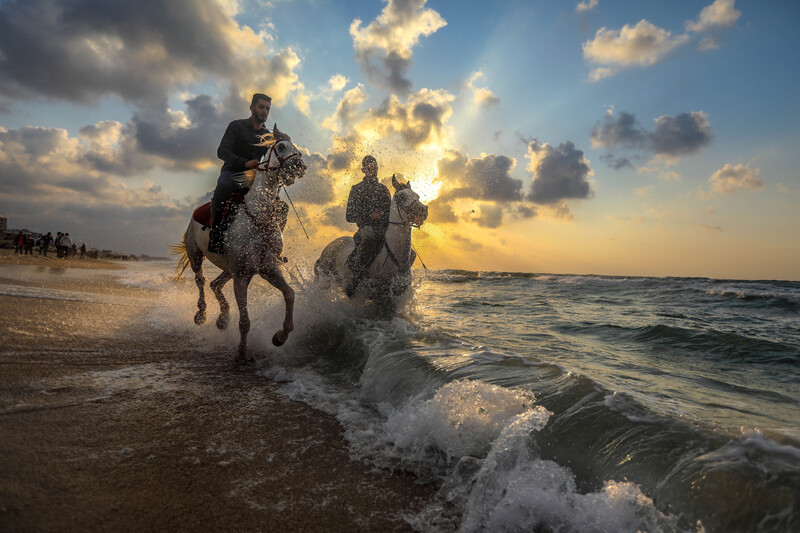
Palestinian men ride horses on a Gaza City beach on the first day after a COVID-19 curfew was lifted, 5 February.
ActiveStills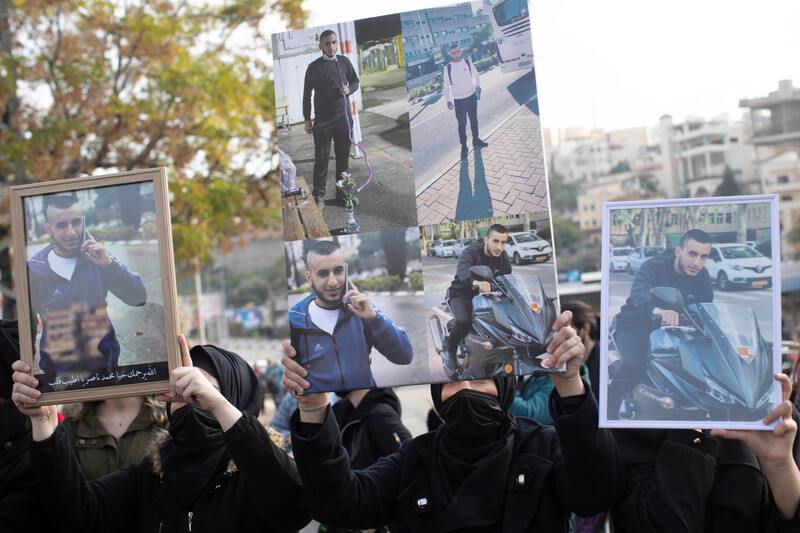
Palestinians in Umm al-Fahm protest on 6 February against Israeli police’s failure to address organized crime and internal violence in Palestinian communities in Israel. Protesters also demonstrated against the Israeli police’s reckless and excessive use of lethal force in the death of 22-year-old Ahmad Hijazi, who was caught in the crossfire between police and armed extortionists and according to witnesses, was hit by police fire.
ActiveStills
Protesters march in Jerusalem on 6 February to demand an end to the evacuation and forcible transfer of residents living in the Palestinian neighborhood of Silwan. Residents of that neighborhood, particularly in the Baten al-Hawa and al-Bustan areas, face a string of demolition and eviction orders to facilitate Israeli settlers’ efforts to colonize the neighborhood near the Old City.
ActiveStills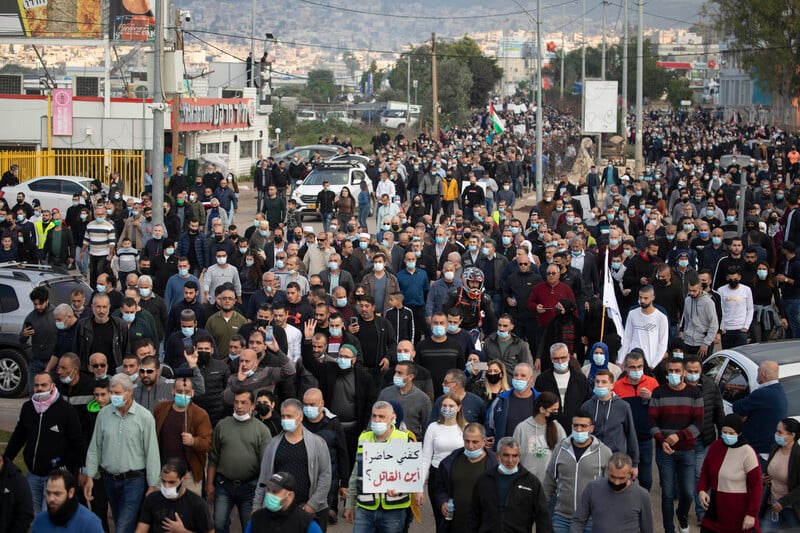
Demonstrators march in Tamra against the handling of organized crime and internal violence within Palestinian communities in Israel as well as excessive police violence, 7 February. Last week, Ahmad Hijazi, a resident of Tamra, was killed after being shot during a gunfight between police and armed extortionists in the town. According to eyewitnesses, Hijazi, who was a bystander, was hit by police fire.
ActiveStills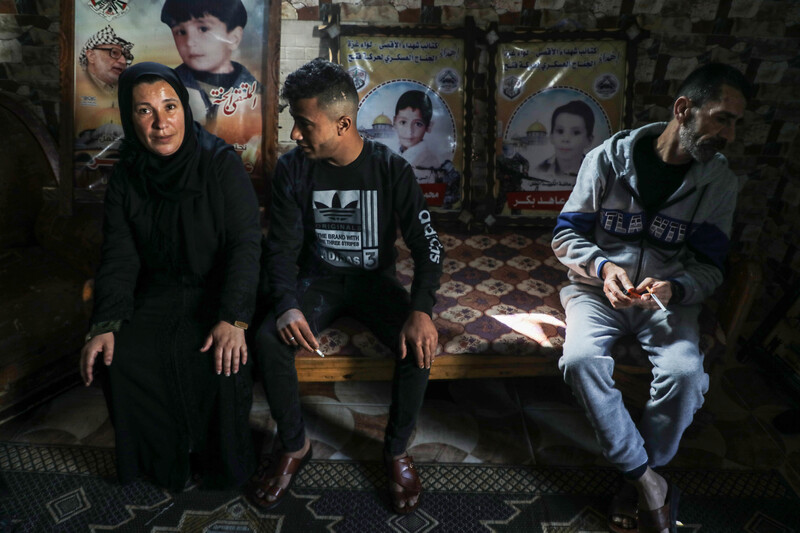
Members of the Bakr family gather in their home in Beach refugee camp in Gaza City on 7 February, surrounded by posters memorializing four children from their extended family who were killed during Israel’s 2014 attack on Gaza. Pictured is the mother of Muhammad, one of the slain children, and his brother, who survived with injuries. The International Criminal Court ruled its jurisdiction extends to the West Bank and Gaza, opening the way to investigating alleged war crimes including those perpetrated during the 2014 attack on Gaza.
APA images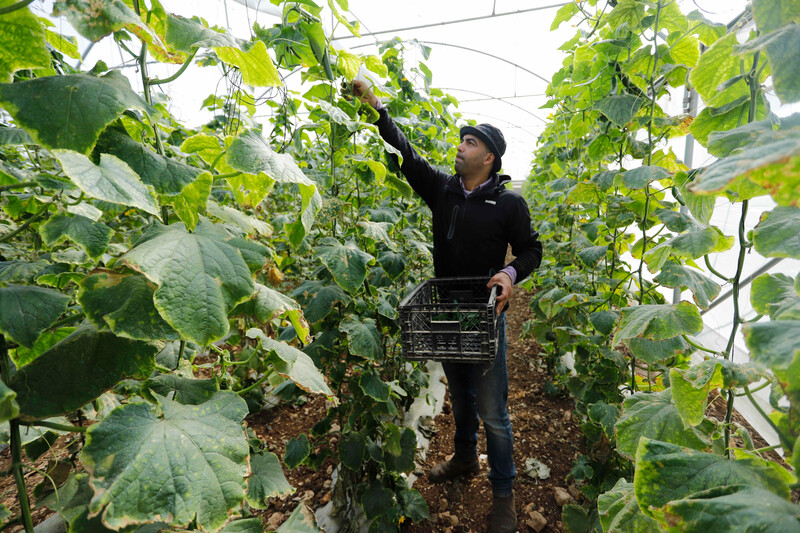
Palestinian farmer Mohammad Kamil harvests cucumber in his greenhouse in the town of Qabatiya, south of the northern West Bank city of Jenin, on 8 February. Kamil uses a private greenhouse to ensure year-round access to crops.
APA images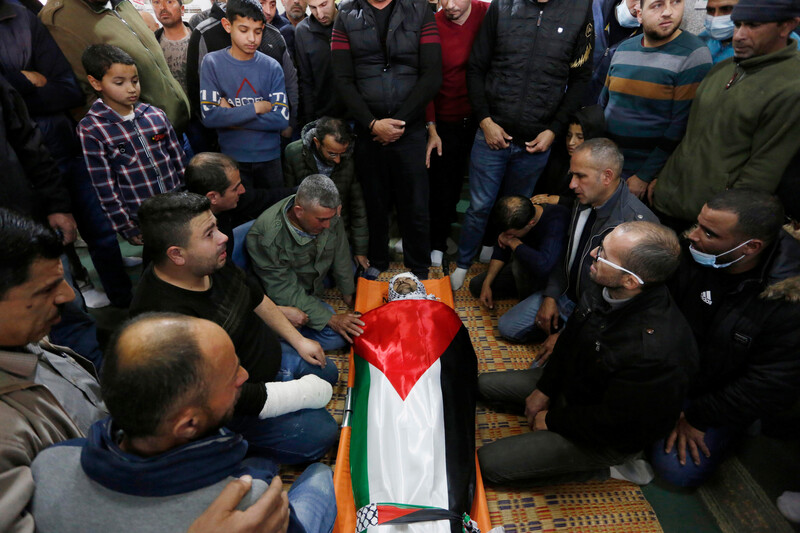
Palestinians mourn during the funeral of Azzam Amer in the West Bank village of Salfit on 11 February. Amer was killed after being run over by an Israeli settler at Kafl Haris junction near Salfit.
APA images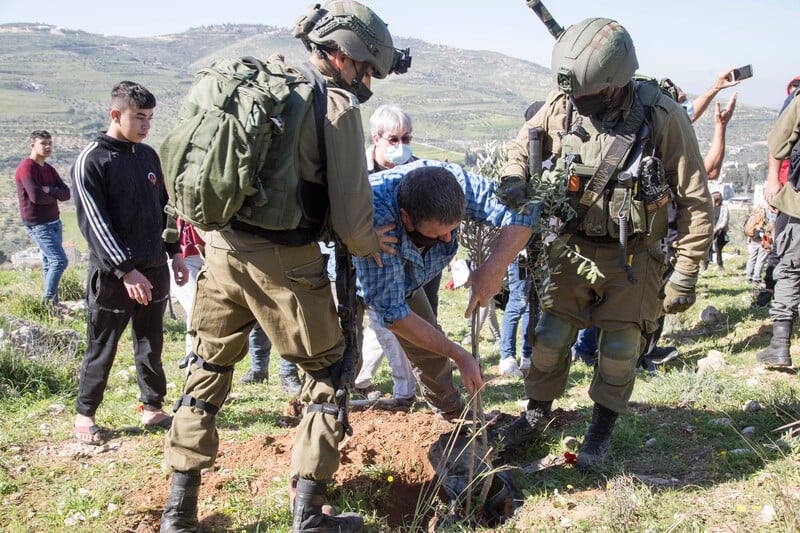
Israeli forces attempt to stop a man from planting on olive tree sapling on land threatened by Israeli settlement expansion in the West Bank village of Burin on 12 February. More than 100 saplings were planted despite Israeli attempts to restrict access to the area with the use of stun grenades and physical violence.
ActiveStills
A Palestinian works at a pottery workshop in Deir al-Balah, central Gaza Strip, on 14 February.
APA images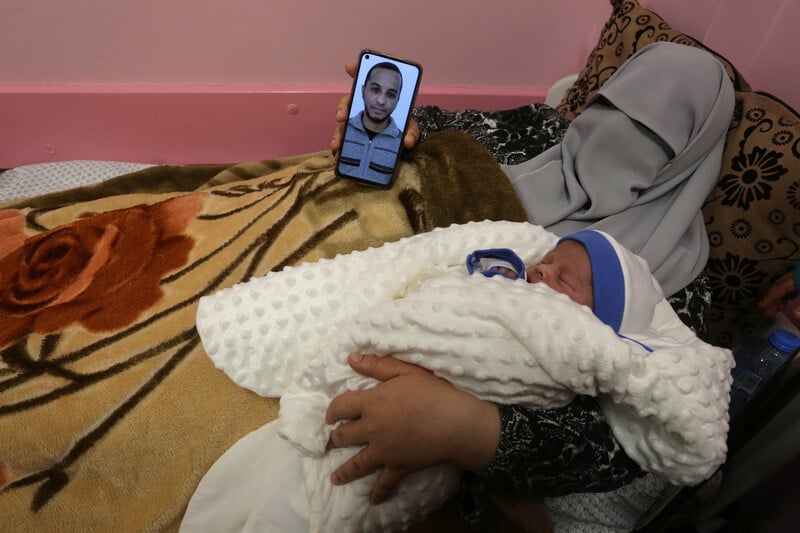
The wife of Palestinian prisoner Mohammad al-Qudra holds their newborn baby, conceived with sperm smuggled out of an Israeli prison, at a hospital in Khan Younis, southern Gaza, 18 February. Since 2004, Palestinian prisoners, denied conjugal visitations, have attempted to have their sperm smuggled out of Israeli prisons so that their wives can be inseminated at fertility clinics in the West Bank and Gaza.
APA images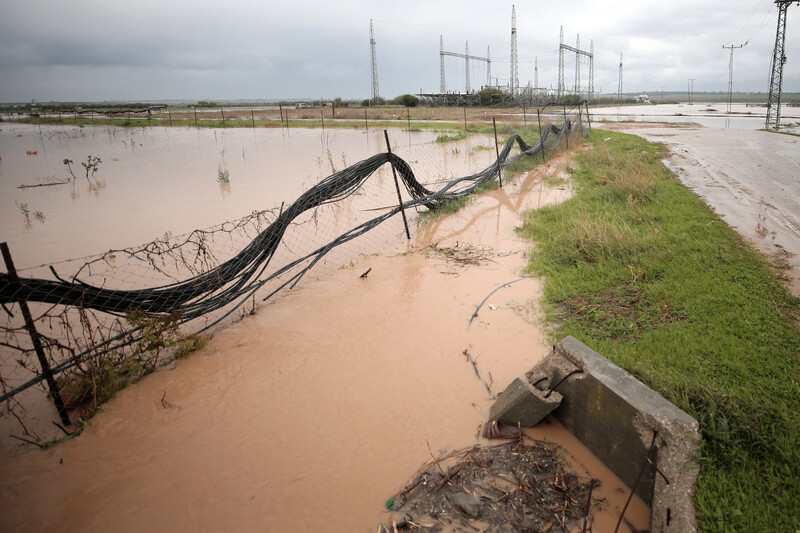
A view of agricultural lands east of Gaza City after being flooded by rainwater near the boundary with Israel on 18 February. Palestinian authorities said the Israeli army opened the floodgates of a canal leading to central Gaza, causing the flooding of several Palestinian homes.
APA images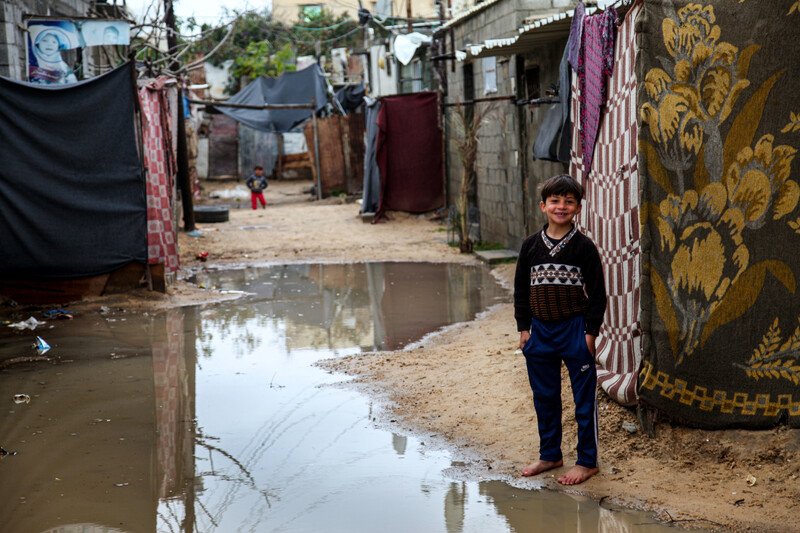
Palestinian children play on a street flooded by rainwater during a stormy day in Beit Lahiya, northern Gaza Strip, on 18 February.
APA images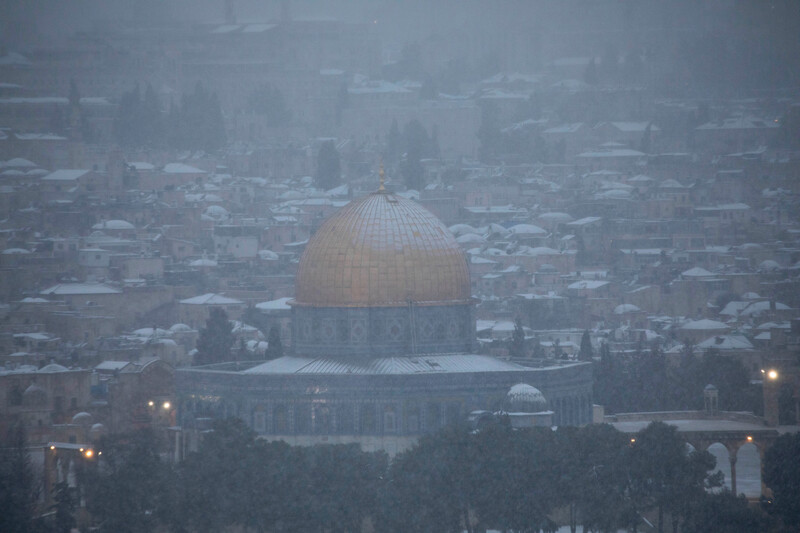
A view of the snow-covered Dome of the Rock during a snowstorm in East Jerusalem on 18 February.
ActiveStills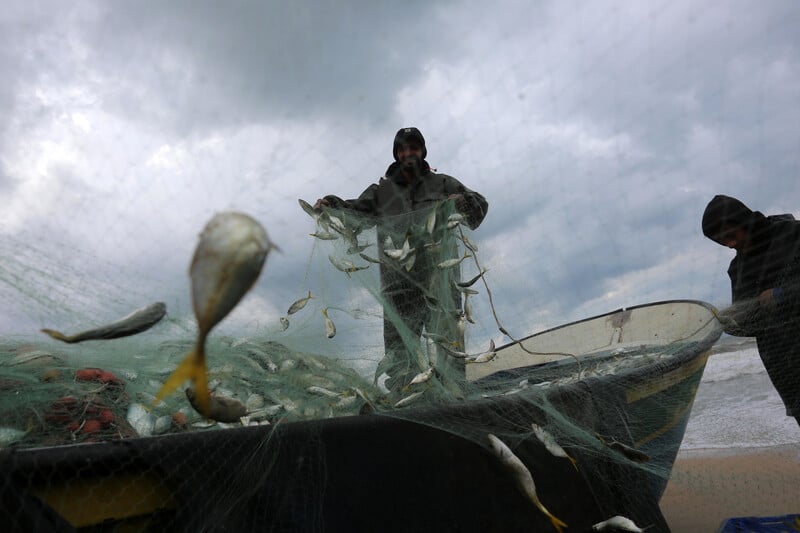
Palestinian fishers with their catch on the beach in Deir al-Balah, central of Gaza Strip, on 19 February. A winter storm led to the disruption of fishers’ work at sea over the previous two days.
APA images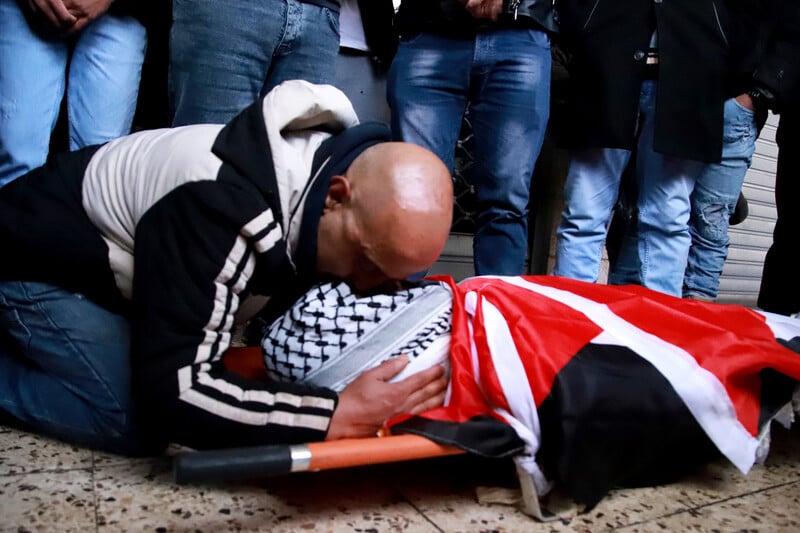
Palestinians mourn over the body of Daoud al-Khatib during his funeral in the West Bank city of Bethlehem on 20 February. Al-Khatib, 45, died of a heart attack in Ofer, an Israeli prison west of Ramallah, on 2 September, only a few months before the end of his 18.5-year sentence.
APA images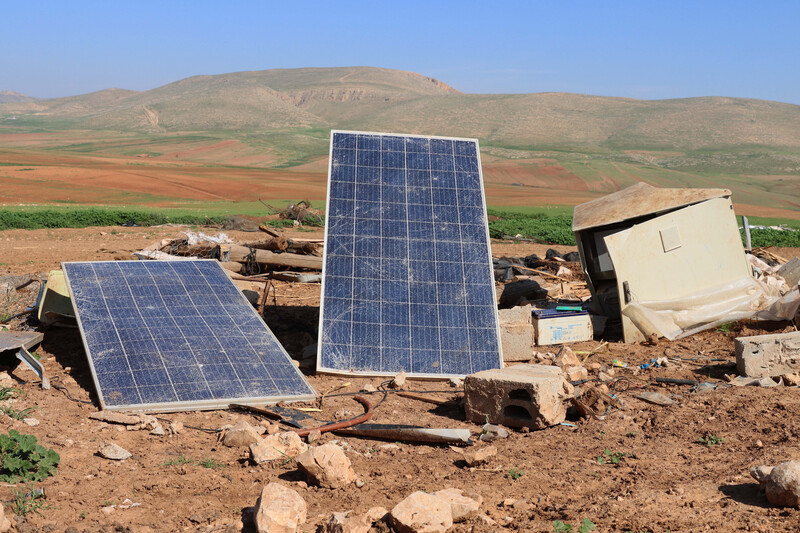
Solar panels lie amid wreckage after the demolition of Khirbet Humsa in the West Bank’s Jordan Valley on 12 February — the fourth time that the community has been razed since November last year. Israeli military authorities have warned residents not to rebuild, and the community has faced repeated demolitions as they attempt to stay on their land.
ActiveStills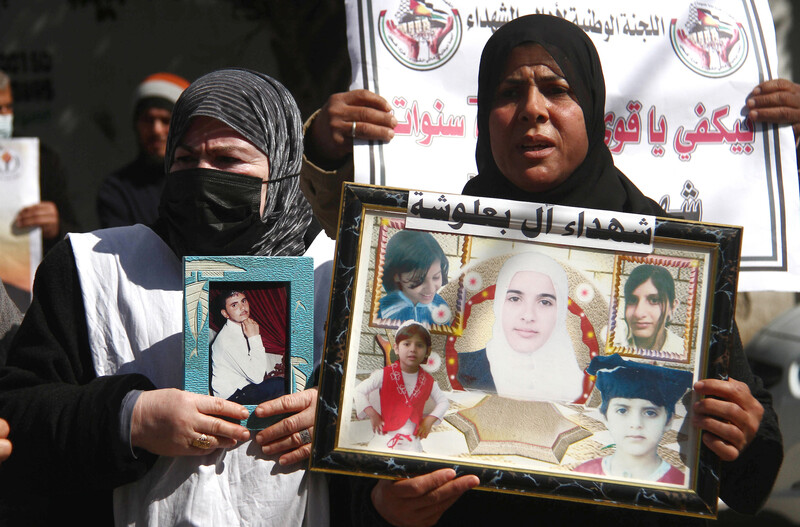
The families of Palestinians who have been martyred and wounded in the context of Israel’s occpuation protest against the Palestinian Authority’s cuts to their salaries for the past seven years, Gaza City, 21 February.
APA images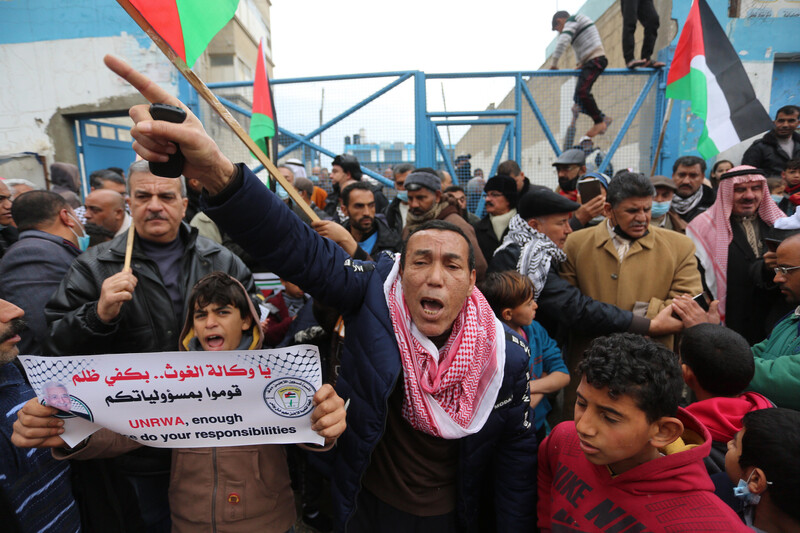
Palestinians protest against food aid reductions by UNRWA in front of the cash-strapped UN agency’s distribution center in Khan Younis, southern Gaza Strip, on 23 February.
APA images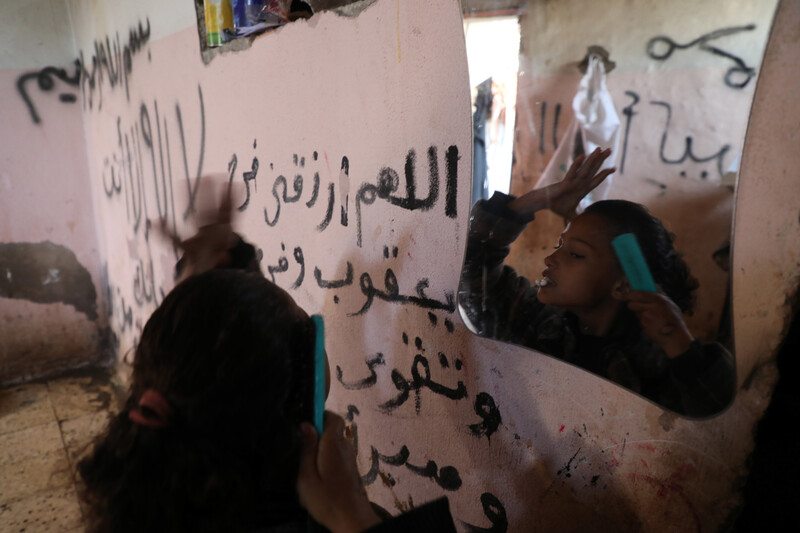
A Palestinian girl brushes her hair at her home in an impoverished neighborhood of Gaza City on 25 February.
APA images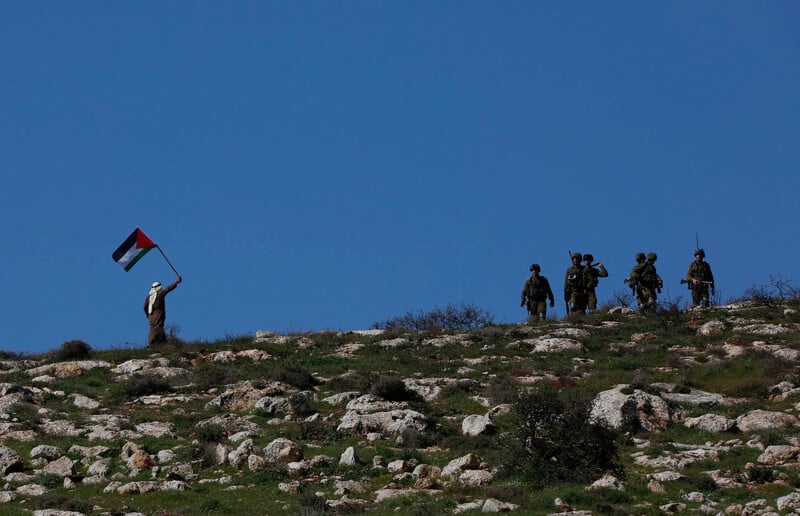
Israeli forces take position during a demonstration against settlement expansion in the West Bank village of Beit Dajan on 26 February.
APA images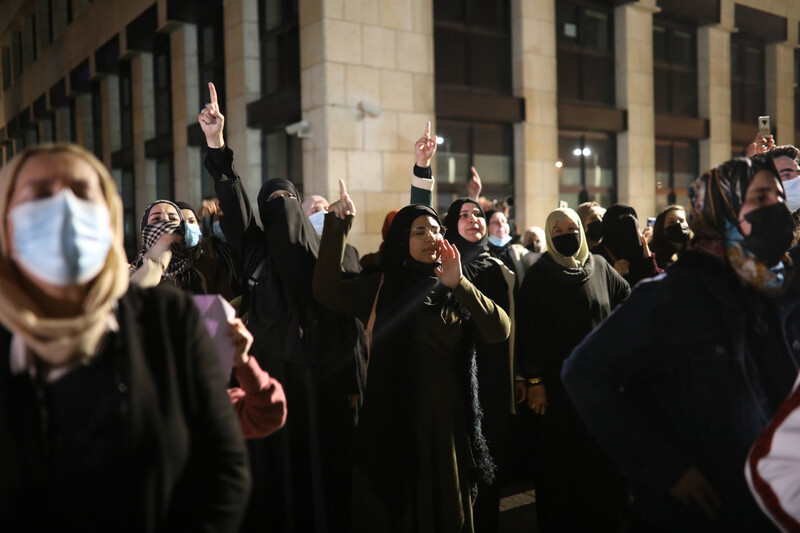
Protesters gather outside the a Haifa court on 27 February in solidarity with four Palestinians arrested a day earlier during a demonstration in Umm al-Fahm. Over the past two months there have been weekly demonstrations in the Palestinian city against Israeli police violence and organized crime.
ActiveStills
A Palestinian receives a dose of the Sputnik V COVID-19 vaccine in Gaza City on 27 February after a shipment from the United Arab Emirates was brought through Rafah crossing.
ActiveStills